State Key Laboratory of High‐Performance Civil Engineering Materials, Nanjing, China, 21‐25 August 2019 International organization by: O.M.Jensen, K.Kovler and C. Miao Local organization by: J.Liu, Q.Tian and C.Yu
September 2019
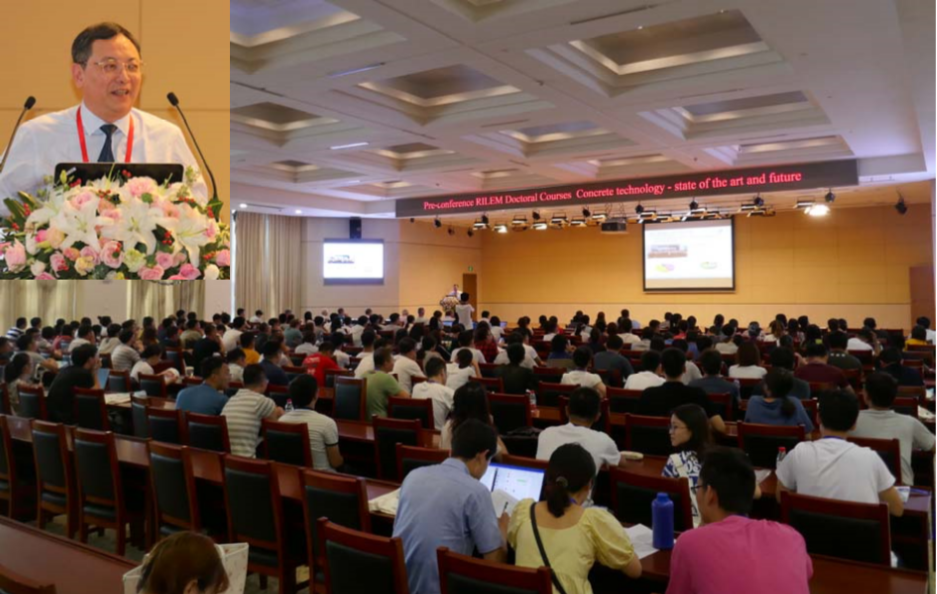
The host Professor Changwen Miao formally opens the doctoral course event and welcomes the participants.
Overview
Before the RILEM week 2019 and conference in Nanjing, China a doctoral course event took place. Students and instructors from several parts of the world participated in the event, which in addition to other activities included a week of on-site activities hosted by and held in the facilities of the State Key Laboratory of HighPerformance Civil Engineering Materials. The course event consisted in five parallel course segments with both separate as well as joint activities. An additional one day segment was also offered. The full course broadly covered concrete technology with the individual segments covering the following, targeted subtopics:
a. Workability and Admixtures
b. Hydration and Microstructure
c. Volume Change and Cracking
d. Durability
e. Multi-scale Modelling
f. Supplementary Cementitious Materials (one day segment)
An example of a program representing the segments a-e is shown below. Each segment consisted in 19 modules. The blue modules were specific for the individual segments, whereas the yellow modules were joint among segments a-e (in segment e, though, the lab exercises were substituted with computer exercises).
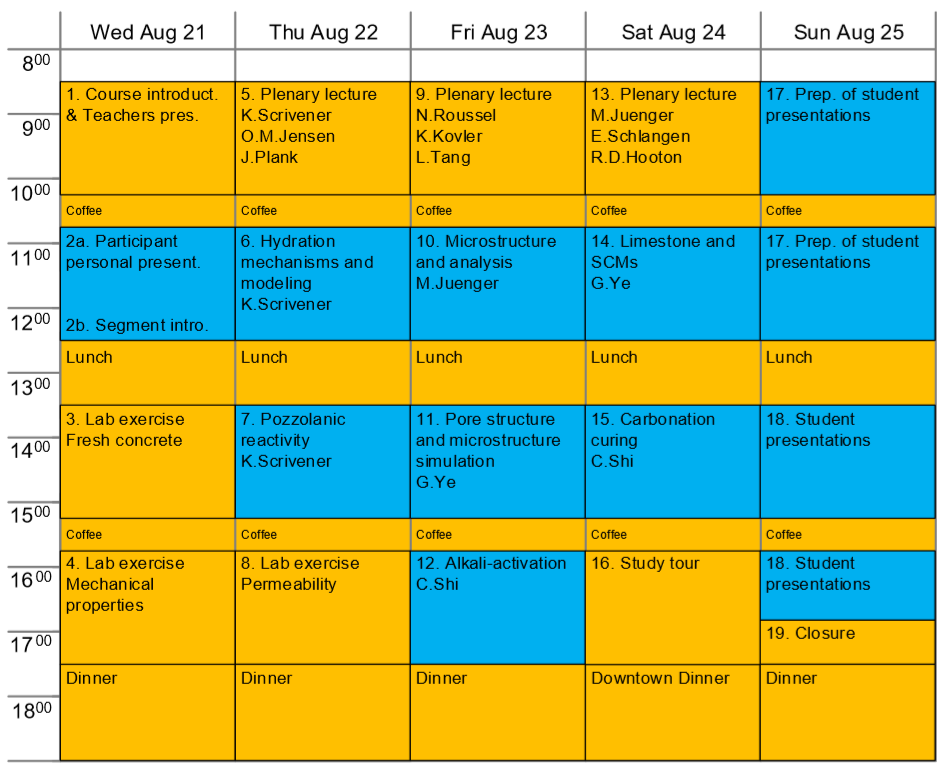
Overview program for the course segment Hydration and Microstructure. The program of the other segments were similar to this one except from segment f, which consisted in a full day of lectures.
Participants
A total of 160 students were registered for the course. Each segment had 30-40 participants. The majority of these were PhD students, but there were also participants from industry and MSc students. The students represented at least 37 different universities in 11 different countries. Instructors came from universities and research institutions in 12 different countries.
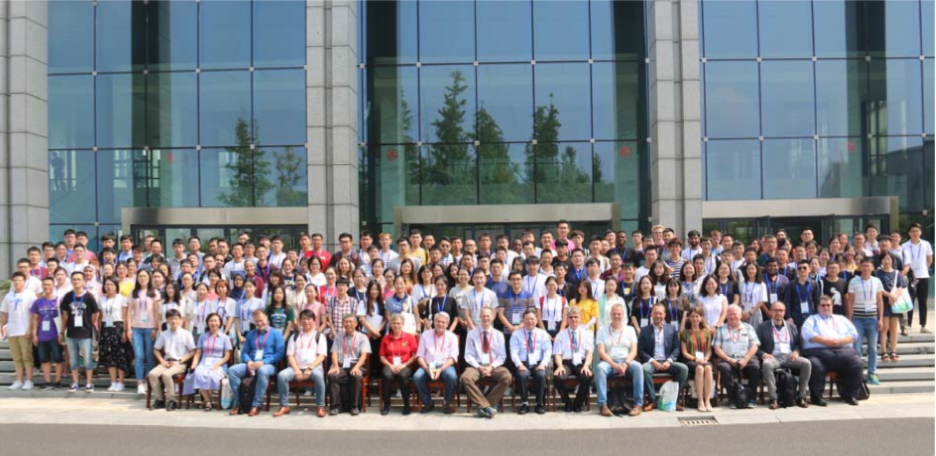
Some of the instructors and course participants taking a small break from the studies.
Scope of course
The course provided an opportunity for the participants to become familiar with the state-of-the-art of concrete technology. Modern concrete is a highly sophisticated material. In many respects it is possible to engineer specific concrete properties, either based on selection of the concrete ingredients, by controlling the concrete mix composition, or by appropriately operating the subsequent mixing, casting and curing process. With proper knowledge, with the aid of proper models, concretes can be produced with targeted properties in its fresh, hardening and hardened state. Volume change and cracking can be minimized, microstructure and durability can be improved and through the use of supplementary cementitious materials and special admixtures concrete properties can be further improved and the environmental footprint from concrete can be reduced.
Contents of course
In addition to frontal lectures the course involved a number of different teaching elements such as preparatory readings, personal presentations, hands-on laboratory exercises, a poster competition, group work and “conference” presentations. Furthermore, the course included a cultural study tour, and social activities during the courses took place to promote a stimulating study atmosphere. All teaching activities were in English. The joint activities included plenum talks (early morning modules 5, 9 & 13) with topic overviews expected to be of interest for all the participants.
Instructors
The following persons lectured at the course:
Jorge Dolado (Materials Physics Center, CSIC-UPV/EHU, Spain)
Doug Hooton (Toronto University, Canada)
Ole Mejlhede Jensen (Technical University of Denmark)
Maria Juenger (University of Texas, Austin, USA)
Kamal Khayat (Missouri University of Science and Technology, USA)
Eddie Koenders (Technische Universität Darmstadt, Germany)
Konstantin Kovler (Israel Institute of Technology)
Kefei Li (Tsinghua University, China)
Zhichao Liu (Wuhan University of Technology, China)
Johan Plank (Technical University of Munic, Germany)
Tian Qian (Jiangsu Research Institute of Building Science & Southeast University, China)
Nicolas Roussel (East Paris University & IFSTTAR, France)
Branko Šavija (Delft University of Technology, The Netherlands)
Eric Schlangen (Delft University of Technology, The Netherlands)
Karen Scrivener (EPFL, Switzerland)
Caijun Shi (Hunan University, China)
Roberto Torrent (Materials Advanced Services Ltd., Argentina)
Luping Tang (Chalmers University of Technology, Sweden)
Fazhou Wang (Wuhan University of Technology, China)
Ziming Wang (Beijing University of Technology, China)
Jason Weiss (Oregon State University, USA )
Guang Ye (Delft University of Technology, The Netherlands)
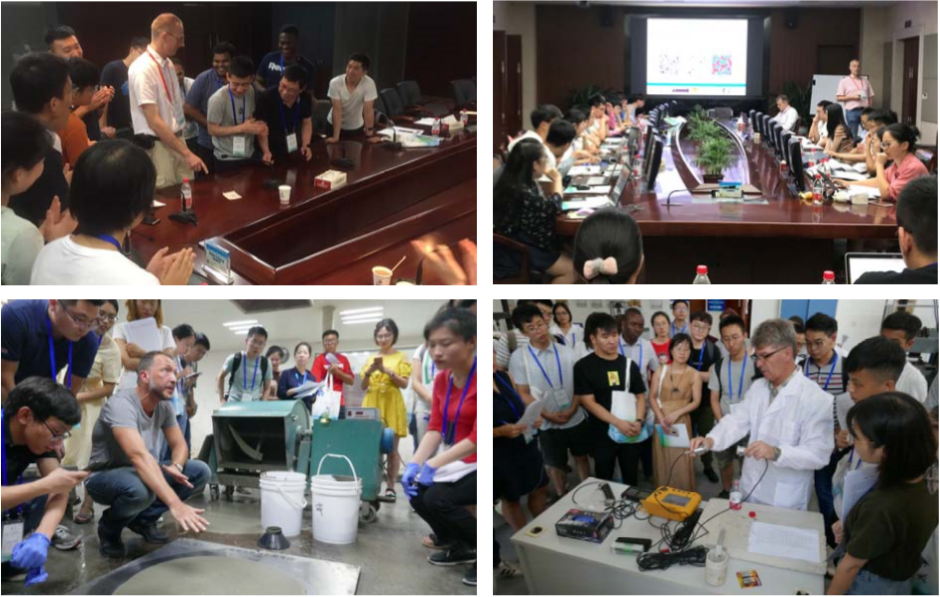
Focused teachers and attentive course participants during the course. Top left: Ole Mejlhede Jensen presents a small experiement during class-room teaching on Volume change and Cracking. Top right: Eric Schlangen instructs in mesoscale computer modelling. Bottom left: Nicolas Roussel tells about the rheological properties of fresh concrete. Bottom right: Konstantin Kovler demonstrates how mechanical properties of concrete can be measured by ultrasound.
Workload, ECTS points and learning outcomes
The workload of each course was approximately 140 hours corresponding to 5 ECTS points, including elements such as the teaching period during the course, readings prior to the course, preparation of personal presentation, and completion of individual posters. The learning outcomes of the participants was evaluated mainly through the individual poster and the plenum “conference” presentations finalizing the course. A certificate of participation was issued to the participants who completed the course.
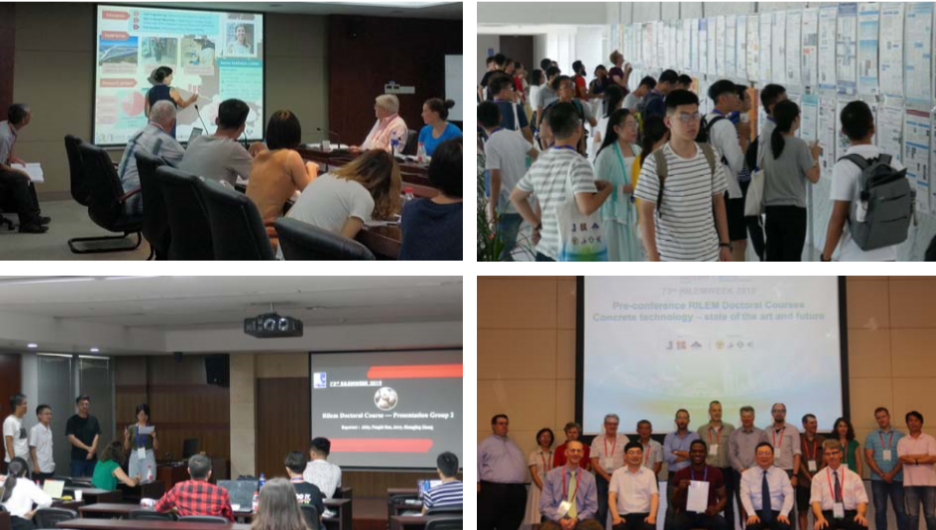
Top left: A course participant gives her personal presentation in the Durability segment with Luping Tang, Doug Hooton and Roberto Torrent listening. Top right: Course participants studying each other’s poster during a coffee break. Participant interaction was promoted by requiring them to vote for a “Best poster student prize”. Bottom left: A group of participants gives a plenum “conference” presentation in the Hydration and Microstructure segment based on course lectures, readings and lab work, with Maria Juenger supervising. Bottom right: A happy course participant receives his 5 ECTS certificate for a wellaccomplished course.
Financial and scientific support
The course was financially supported by Jiangsu Sobute New Materials Co. (Ltd) and the State Key Laboratory of High Performance Civil Engineering Materials. The students and teachers were impressed by the extent of support. Scientific approval, so-called scientific sponsorship, of the full doctoral course was given by Southeast University, The Chinese Academy of Engineering, The National Natural Science Foundation of China, and the Educational Activities Committee of RILEM, and specific scientific sponsorship for the course segment on Volume change and Cracking was given by the RILEM Technical Committee on “Controlled expansion of concrete by adding MgO-based expansive agents taking the combined influence of composition and size of concrete elements into consideration” (TC-CEC). The sponsorships were mentioned at the course and written in course material. Furthermore, information was given on the complementary 3-years RILEM membership offered to PhD-students participating in the doctoral course.
Course evaluation
At the end of the course an anonymous, written evaluation was conducted which dealt with all parts of the course. On a scale “unsatisfactory, bad, satisfactory, well, very well”, far the majority of the responses were “very well”. Many students expressed that they found the course very useful for their PhD-studies. Written evaluation comment by a student: “It is my first time to participate in such an international study course. It is amazing and interesting for me. Professors come from all over the world and made outstanding contribution in their research fields. The course content is very classical and detailed, and professors are also very humorous and patient. I have learned much about concrete and had some of my doubts answered. I expect to attend the next course.”.
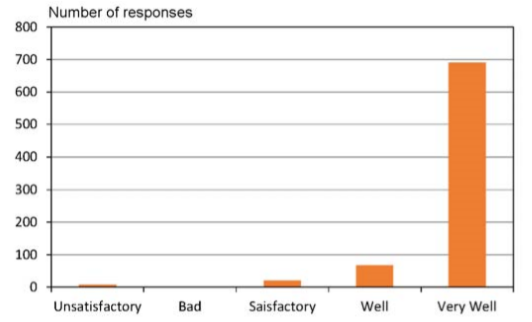
Evaluation responses by the participants – they were very satisfied with the courses.
Based on the responses received through the questionnaires and personal contacts during and after the course it is concluded that the event was very successful. The link between conference and doctoral course also seems successful as about 1/3 of the course participants also participated in the subsequent conference.
Continuation of the course
Doctoral courses are already planned for Israel 2020 and Mexico 2021, and it is expected that another course on a related topic will be organized in Nanjing within the next four years.
Ole Mejlhede Jensen, Konstantin Kovler and Changwen Miao, September 20, 2019
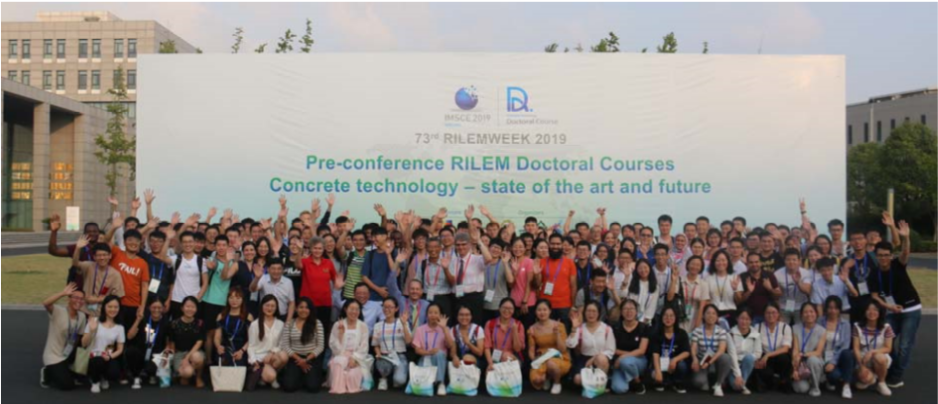
Farewell greetings by some of the instructors and course participants.
 High Performance Water-reducing AdmixtureHigh Performance Polycarboxylate Superplasticizer Functional Polycarboxylate SuperplasticizerWater-reducing Admixture AuxiliariesSuperaccelerator/Strength-enhancerDurability-enhancing AdmixturesScreening Series
High Performance Water-reducing AdmixtureHigh Performance Polycarboxylate Superplasticizer Functional Polycarboxylate SuperplasticizerWater-reducing Admixture AuxiliariesSuperaccelerator/Strength-enhancerDurability-enhancing AdmixturesScreening Series









